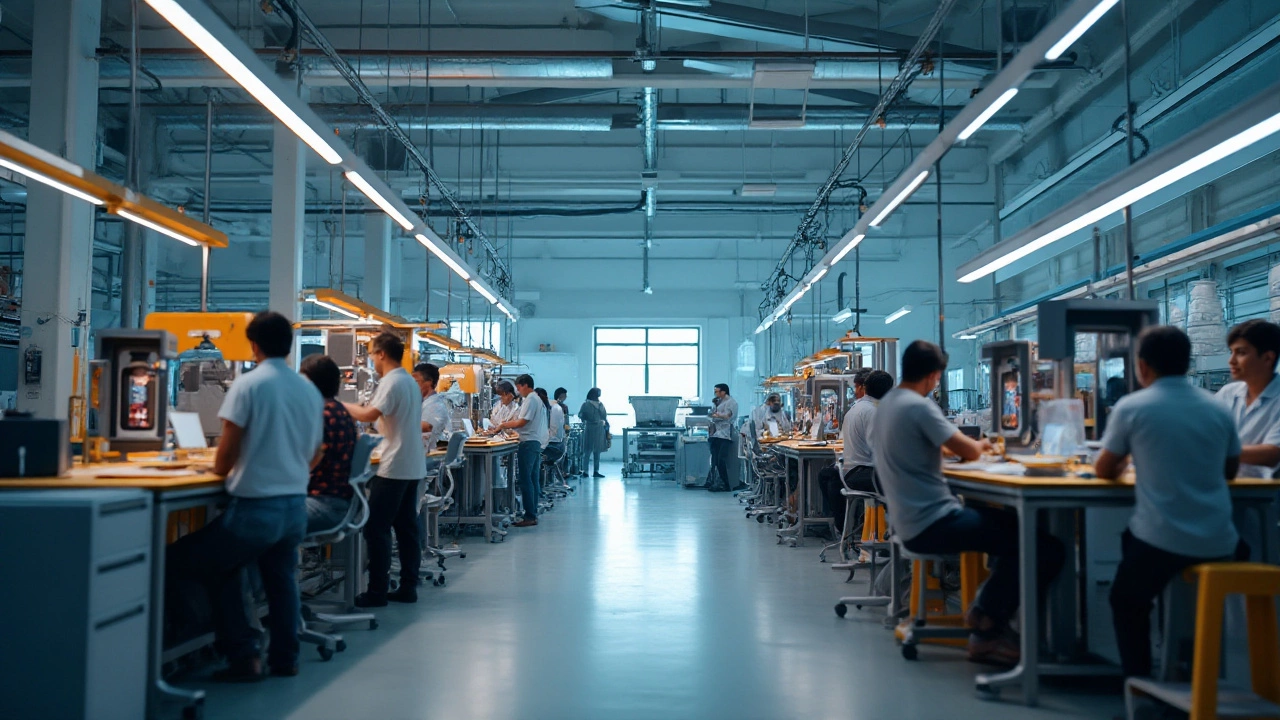The manufacturing sector is a dynamic space with endless possibilities. As 2025 unfolds, entrepreneurs are eyeing unique opportunities that not only align with consumer needs but also set a foundation for future growth. Shifts in consumer behavior, environmental concerns, and technological innovations have paved the way for new and exciting manufacturing ideas.
Whether it's tapping into the sustainability movement or jumping on the tech train, there's a plethora of items ripe for production. Aspiring business owners should pay attention to these trends to ensure their ventures find success in today's competitive market landscape.
- Emerging Trends in Manufacturing
- Sustainable Products
- Tech-Driven Innovations
- Customized Goods
- Challenges in Manufacturing Startups
- Tips for Success in 2025
Emerging Trends in Manufacturing
The manufacturing industry is on the cusp of a new era, with several emerging trends reshaping how businesses approach production. One of the most significant shifts is the move towards more tech-driven innovations. From AI-powered machinery to the integration of IoT devices on the production floor, technology is improving efficiency, reducing waste, and cutting costs. This evolution allows manufacturers to produce high-quality items at a faster rate and with greater precision.
Another trend making waves is the focus on sustainable products. Consumers are becoming increasingly conscious of their environmental footprint, leading manufacturers to adopt eco-friendly practices. This includes using renewable energy sources, reducing emissions, and employing sustainable materials. Companies are now under pressure to not only promise green solutions but to prove them through certifications and transparent processes.
Customization is also a key player in today’s manufacturing landscape. Thanks to advancements in digital printing and other forms of agile manufacturing, companies are now able to offer personalized products at scale. This is especially important in industries like fashion, electronics, and consumer goods. Customers love products that speak directly to their individuality, and the ability to provide this can set a business apart from its competitors.
A report by McKinsey suggests that by 2025, personalized goods will account for a significant share of the market, pushing manufacturers to rethink their traditional mass production lines and invest in more flexible solutions. Adaptability is the name of the game, as businesses need to pivot quickly according to consumer demands and market shifts.
Digital twins, a relatively new concept, are also changing how manufacturers operate. By creating a virtual representation of a product or production process, companies can simulate different scenarios and troubleshoot potential issues. This technique aids in lowering costs associated with defects or downtime, allowing for a proactive rather than reactive approach.
Lastly, with global supply chains facing disruptions over recent years, there is a trend towards reshoring, or returning production close to or within domestic borders. This reduces dependencies on overseas facilities and shortens supply lines, ensuring steadier access to materials and components. A more local approach not only strengthens national economies but also boosts job creation in manufacturing sectors that may have been declining over the years.
"The future of manufacturing belongs to the flexible and the agile." — Industry Week
These trends signify a transformative time, urging manufacturers to integrate cutting-edge technology and adopting sustainable, customer-focused practices. Those who seize these opportunities are likely to flourish in this rapidly evolving industry, meeting both market demands and the aspirations of entrepreneurs dreaming of a successful, modern startup.
Sustainable Products
In the vibrant world of manufacturing startups, sustainable products have carved a niche that speaks not only to the economy but also to the very ethos of conscious living. Today's consumers are more environmentally aware, driving the demand for products that leave a minimal carbon footprint. This cultural shift has inspired entrepreneurs to focus on producing goods that are not only eco-friendly but also profitable. Among the numerous options, products made from recycled materials, biodegradable goods, and energy-efficient appliances are taking center stage. As this trend becomes more mainstream, businesses that specialize in sustainable manufacturing find themselves at an advantage, armed with innovations that appeal to both consumers and investors alike.
Creating sustainable goods involves more than just using green materials; it requires a comprehensive approach that encompasses ethical sourcing, low-impact production, and waste reduction. Entrepreneurs entering this space should be prepared to invest in technologies and practices that support these goals. The rise in popularity of these products is evidenced by a forecast from a 2023 study conducted by The Economist Intelligence Unit, which estimated that the market for sustainable goods would grow by 8% annually. This data highlights the potential for profitability while also reinforcing the importance of sustainability in modern manufacturing. Additionally, organizations are beginning to understand that investing in sustainability can reduce costs through energy savings and waste minimization in the long run.
Prominent voices in the industry, like renowned environmentalist David Suzuki, have frequently emphasized the importance of sustainable practices. As Suzuki once eloquently put it,
"The economy is a wholly-owned subsidiary of the environment, not the other way around."This perspective is crucial for entrepreneurs to internalize as they navigate the manufacturing domain. By recognizing the interconnectedness of economic success and environmental stewardship, startups can position themselves as pioneers in an increasingly conscious marketplace. They should strive to innovate in areas that align with consumer expectations and regulatory requirements, thus ensuring compliance and fostering trust among stakeholders.
For those looking to dive into the sustainable product market, it's essential to consider consumer preferences, which are increasingly leaning towards transparency and authenticity. Offering a genuinely sustainable product involves maintaining openness about sourcing, manufacturing processes, and product lifecycle. Detail-oriented consumers can become brand advocates when they see genuine efforts in sustainability. To enhance this experience, providing educational content about the benefits and impact of these products can forge a deeper connection with your audience. This not only helps the business grow but also contributes to the broader social movement toward sustainability.

Tech-Driven Innovations
In the vibrant world of manufacturing, tech-driven innovations are not just buzzwords; they are the cornerstone of modern industry and the lifeline for startups aiming to make a mark. The rapid advancement in technology has transformed traditional manufacturing processes, introducing a realm of possibilities that were once unthinkable. From 3D printing to AI and robotics, the incorporation of technology is reshaping product lines, refining efficiencies, and reducing barriers to entry for new businesses.
Among the most groundbreaking technologies fueling startups is 3D printing. This innovation allows for unparalleled customization, enabling manufacturers to produce detailed prototypes and final products directly from digital models. The appeal of 3D printing lies not just in its ability to produce complex geometries but also in its cost-effectiveness, especially for small batch productions. With advancements in materials like metal and bio-waste, 3D printing is expanding its application across diverse industries, from medical devices to automotive parts. This trend aligns perfectly with the growing consumer demand for customized goods that cater to personalized needs. A report by the International Data Corporation (IDC) suggests that global spending on 3D printing will reach over $28 billion by 2024.
Artificial Intelligence (AI) is another transformative force for manufacturing startups. By leveraging machine learning algorithms, businesses can analyze vast troves of data to optimize production processes, predict maintenance needs, and enhance supply chain efficiency. AI-driven solutions are particularly essential in maintaining quality control, identifying defects through image recognition, and minimizing waste. Companies integrating AI in manufacturing processes often experience a robust increase in operational efficiency, as noted in a Deloitte study that highlighted a 15% productivity boost for companies employing AI solutions.
Equally influential are smart robotics, which are revolutionizing assembly lines and warehouse management. Robots equipped with sensors and connected via the Internet of Things (IoT) work alongside humans to carry out repetitive tasks with precision, ensuring timely and error-free production. Robotics enhances scalability while maintaining high standards of quality, crucial for startups aiming to compete against established players. It's fascinating that robotics manufacturing market is expected to show a compound annual growth rate (CAGR) of 10% from 2021 to 2027, illustrating an insatiable demand for innovation in this space.
Emerging technologies also cater to the latest trends in sustainable products, with startups adopting eco-friendly manufacturing materials and practices. Tech-driven solutions such as blockchain have introduced transparency into product sourcing, offering consumers peace of mind about their purchases' environmental impact. Blockchain technology can ensure every step of the product cycle is traceable, fostering a new age of responsible manufacturing that aligns with the values of the eco-conscious buyer.
As we delve into 2025, the opportunity for technology-driven manufacturing innovations remains vast. Startups equipped with a tech-savvy approach not only address the changing consumer landscapes but also gain a competitive advantage that paves the way for future success. Embracing these innovative technologies becomes not just an advantage but a necessity in evolving to meet the needs of modern society.
Customized Goods
In our fast-paced world, personalization has become more than just a trend—it is a demand. The allure of customized goods cannot be understated, as consumers increasingly seek products that reflect their individual preferences and identities. This shift is reshaping the manufacturing sector, providing fertile ground for startups that can deliver unique and personalized offerings. Whether it's custom apparel, bespoke furniture, or tailor-made jewelry, the possibilities are as endless as the creativity driving them. The capability to mass-produce bespoke items was once a logistical nightmare, but technological advancements, particularly in AI and 3D printing, have paved the way for scalable customization in manufacturing.
The rise of digital platforms and e-commerce has played a significant role in this market evolution. Entrepreneurs can now directly tap into consumer desires, providing tailor-made experiences right from product design through production and delivery. Studies indicate that over 60% of consumers prefer brands offering personalized shopping experiences, hinting at the immense market potential. The marriage of technology and manufacturing allows for on-demand production, minimizing waste and aligning with the sustainable product ideals many consumers now cherish.
"The secret of successful customization lies not just in understanding customer preferences but in anticipating them," says Fiona Lambert, a renowned innovation consultant.
Businesses venturing into customized goods must be aware of both the opportunities and challenges inherent in this niche. The upfront investment in technology, from CAD designs to proficient 3D printers, can be substantial. Additionally, the logistics of handling millions of unique orders can pose significant operational challenges. However, the rewards of capturing a loyal and potentially lifelong customer base far outweigh these hurdles. To achieve success, firms should consider integrating data analytics to forecast trends and streamline production processes. Addressing customers' evolving tastes promptly can enhance customer satisfaction and brand loyalty.
Furthermore, emerging markets offer valuable insights into the demand for personalized goods. In countries like China and India, there's a burgeoning middle class eager for products that can affirm their personal and cultural identity. Innovative manufacturing startups can explore these regions for expansion, armed with a product lineup that speaks to local aesthetics and traditions. Entrepreneurs should leverage social media platforms to establish a community-driven brand presence, allowing for feedback mechanisms that will inform and evolve their product offerings. With the dynamic nature of consumer preferences, flexibility should be an integral aspect of their business strategy.

Challenges in Manufacturing Startups
Launching a manufacturing startup in 2025 is both exciting and fraught with potential obstacles. For many aspiring entrepreneurs, understanding these challenges is crucial for navigating the path towards success. One of the foremost challenges is capital investment. Unlike other sectors, manufacturing requires a substantial initial investment in machinery, raw materials, and labor. This investment carries a significant risk, as return on investment can be slow, particularly in the early stages. This financial burden can deter many potential entrepreneurs from pursuing their manufacturing startup dreams, locking opportunities behind fiscal barriers.
Another pivotal challenge is regulatory compliance. Manufacturing is heavily regulated, and for good reason. From environmental laws to labor standards, startups must navigate a complex web of legal requirements. These regulations vary widely by region and can be costly to adhere to, both financially and in terms of time. For instance, sustainable products may need to meet specific environmental standards, which could involve expensive certifications or changes in production techniques.
Supply chain management also poses a significant hurdle. In today's interconnected world, geopolitical events, pandemics, or natural disasters can disrupt supply chains, leading to delays and increased costs. The reliance on global supply chains means that even minor disruptions can escalate rapidly, making stability a constant challenge. Entrepreneurs need to establish robust and flexible supply chains to mitigate these risks, often a daunting task for those with limited industry experience.
Labor shortages and skills gaps represent another critical issue. Despite advancements in automation and technology, human elements remain essential in manufacturing. However, attracting skilled workers in this competitive industry is increasingly difficult. In fact, a report from the National Association of Manufacturers highlighted that nearly two-thirds of manufacturers struggle to find skilled enough workers.
Competition is fierce. As technology evolves, barriers to entry lower, allowing a greater number of startups to enter the market. While this can drive innovation, it also means that distinguishing one's product from competitors is challenging. Unique selling points, quality control, and brand reputation become not just bonuses but necessities for survival.
"Adaptability in the face of rapid change is what keeps leaders ahead. The manufacturing world respects those who can pivot efficiently," said Jacob Turner from the Industry Leadership Council.
In light of these challenges, successful manufacturing startups are those that maintain a clear strategy, possess resilient leadership, and foster a culture of continuous improvement. Aided by technology and keen market insights, the likelihood of overcoming these hurdles increases. Understanding the shifting landscape and preparedness for unforeseen changes will be key differentiators for future manufacturing startup success.
Tips for Success in 2025
Success in the ever-evolving world of manufacturing startup ventures hinges on a blend of innovation, adaptability, and market awareness. As we settle into 2025, several strategic pointers can position your startup for success. To start with, understanding the current consumer landscape is crucial. This era is marked by a heightened consumer interest in sustainable and ethical products. Entrepreneurs should adapt by incorporating eco-friendly materials and processes, such as recyclable packaging or renewable energy, to not only meet consumer demand but also reduce overall manufacturing costs. Moreover, leveraging technology to maintain efficiency and quality can set a startup apart. Implementing smart manufacturing techniques like IoT and AI allows businesses to automate tasks, predict maintenance needs, and improve product quality.
Networking and partnerships play a vital role in the growth of manufacturing startups. Building a reliable network of suppliers, vendors, and industry experts can provide invaluable insights and open doors to new opportunities. By attending industry conventions and seminars, startups can stay abreast of the latest trends and innovations. It's also important to cultivate a strong digital presence through social media and influencer collaborations, as these channels can enhance brand visibility and customer engagement. Moreover, keeping a keen eye on financial planning is essential. More than ever, startups need to carefully strategize their budget, focusing on essential investments such as cutting-edge equipment and skilled talent. It’s advisable to keep an emergency fund for unforeseen expenditures and strategize a path for consistent revenue generation.
Innovation and flexibility are key attributes of successful startups in 2025. Market needs and technologies change rapidly, requiring entrepreneurs to be quick at pivoting their strategies. Regularly engaging with customers through surveys or feedback platforms can provide insights on areas for improvement or innovation. A practical approach is to develop prototypes and test them with a select group before mass production. This reduces the risk of wasteful production and aligns products closely with market preferences. Consider diversifying your product lines to cater to various audiences and markets, as reliance on a single product could pose risks. For many startups, success often lies in their ability to provide custom solutions tailored to specific client needs, offering a unique edge over competitors.
| Aspect | Action |
|---|---|
| Sustainability | Use eco-friendly materials |
| Technology | Implement IoT in production |
| Networking | Attend industry events |
| Financial Planning | Focus on essential investments |
"In today's manufacturing landscape, those who embrace change with vigor are likely to walk the paths of unrivaled success." - A visionary foresight by an industry leader.
Finally, cultivating a strong company culture that prioritizes innovation, diversity, and inclusivity can drive a manufacturing startup forward. A motivated team that feels valued is more likely to contribute innovative ideas and collaborate effectively. Encouraging continuous learning opportunities and creating a robust support framework within the company can aid in talent retention and foster an environment of creative problem-solving. In summary, navigating the manufacturing startup world successfully in 2025 demands a proactive approach, a strong grasp of emerging trends, and a dedication to continual improvement.
